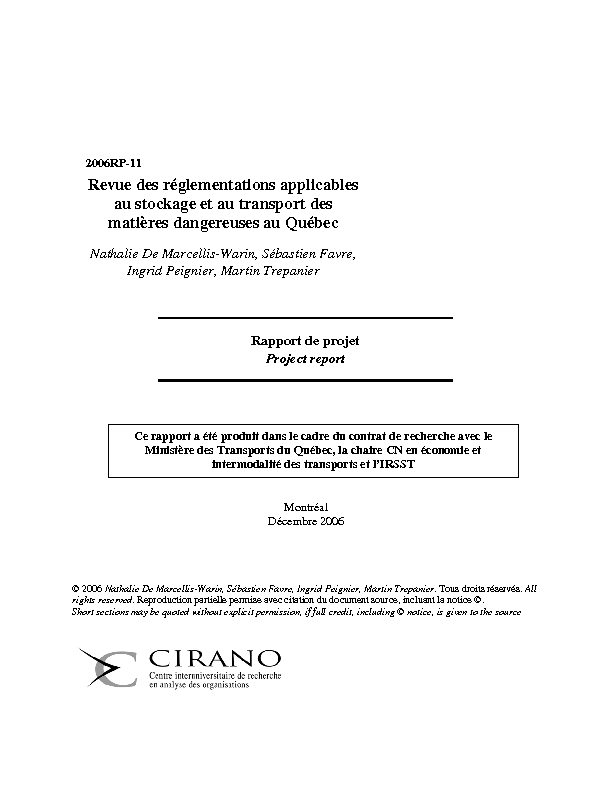Revue des réglementations applicables au stockage et au transport des matières dangereuses au Québec
This report presents a review of regulations applicable to storage, handling, and transportation of dangerous goods in Quebec. These various laws/regulations will force the logistic choices of the companies which produce, use or transport dangerous goods (for example, obligation of a transport mode for particular dangerous goods, threshold quantity imposed for storage, obligation to transport, etc ).
Thus, in the first part, we analyzed the regulations concerning public safety, environment, transport and work safety and security. We also flew over the American regulations taking into account the proximity of Canada with this country and the importance of north-south transport flow. In the second part of this report, we were more interested to explain the possible similarities, disparities and contradictions between each analyzed regulation.
The complete version of this publication is confidential.
NOTE
This research was carried out within the framework of the research project GLOBAL. The objective of the GLOBAL research project set up by INERIS (National Institute of the Industrial Environment and the Risks) in France is to develop a methodology to evaluate the risk of storage and transportation of dangerous goods.
Actually, industrial activity requires the production and the use of dangerous goods in the chemical plants. It also requires their transport between these installations. These products induce risks on the plants sites, but also between them, because of their transport. Today, regulations constrain on one hand chemical plants to minimise their risks and on the other hand the transport of dangerous goods. This is in this context that the present GLOBAL project will examine how the logistic strategies of the industrialists can influence the risks due to the transport of dangerous goods. For example, by minimising the quantities stored in the fixed installations, does one increase the risks due to transport and in this case, up to what extent? Thus the main objectives of the research are: first to examine new risks assessments methods in order top provide harmonised quantification of the chemical risks and to propose possible policies for the global decrease of risks.
The collaboration of the CIRANO and the École Polytechnique de Montréal to the GLOBAL project consist, on the one hand, of several operations performed jointly with INERIS (our team taking care of the application in Quebec of these operations):
In addition, our team will work on the two following research themes:
It consist actually in trying to understand which are the costs associated with transport of dangerous goods and on the other hand understand the arbitration made by facilities in their logistic strategies, for example, transport versus storage but also in the choices of carriers, choice of itineraries, choice of transport mode, . We would like to measure the economic cost of the transport of the dangerous goods, to know the factors which influence the logistic choices (for example, necessary training of the workers, working conditions, history of accidents, comparison of the amount of CSST premium, reputation of the carriers, etc.) and to evaluate if the fact of having a total knowledge of the risk (storage and transport) and of its potential impacts would modify the global decisions.
The purpose is to study a few cases which might induce a transfer of risk from the fixed installations towards freight vehicles of dangerous goods, for example by decreasing the quantity stored in the fixed installations and by increasing the quantity stored temporarily in the bulks. It will consist in understanding the mechanisms of the transfer, judging their interest and their disadvantages, finding means of avoiding them if the disadvantages are significant, and then considering solutions of global management of the dangerous goods.
This report presents the operation B of the GLOBAL project, i.e. Review of regulations applicable to storage, handling, and transportation of dangerous goods in Quebec (regulations concerning public safety, environment, transport and work safety and security).




